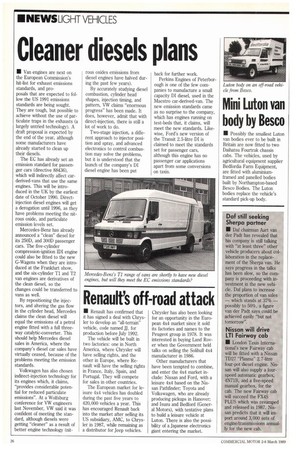Cleaner diesels plans
Page 28

If you've noticed an error in this article please click here to report it so we can fix it.
• Van engines are next on the European Commission's hit-list for exhaust emissions standards, and pro posals that are expected to follow the US 1991 emissions standards are being sought. They are tough, but possible to achieve without the use of particulate traps in the exhausts (a largely untried technology). A draft proposal is expected by the end of the year, although some manufacturers have already started to clean up their diesels.
The EC has already set an emission standard for passenger cars (directive 88436), which will indirectly affect carderived-vans that use the same engines. This will be introduced in the UK by the earliest date of October 1990. Directinjection diesel engines will get a derogation until 1996, as they have problems meeting the nitrous oxide, and particulate emission levels set.
Mercedes-Benz has already announced a "clean" diesel for its 250D, and 300D passenger cars. The five-cylinder compression-ignition IDI engine could also be fitted to the new G-Wagens when they are introduced at the Frankfurt show, and the six-cylinder Ti and T2 van engines are derivatives of the clean diesel, so the changes could be transferred to vans as well.
By repositioning the injectors, and altering the gas flow in the cylinder head, Mercedes claims the clean diesel will equal the emissions of a petrol engine fitted with a full threeway catalytic-converter. This should help Mercedes diesel sales in America, where the company's diesel car sales have virtually ceased, because of the problems meeting the emission standards.
Volkwagen has also chosen indirect-injection technology for its engines which, it claims, "provides considerable potential for reduced particulate emissions". At a Wolfsburg conference for VW engineers last November, VW said it was confident of meeting the standard, although diesels were getting "cleaner" as a result of better engine technology (nit rous oxides emissions from diesel engines have halved during the past few years).
By accurately studying diesel combustion, cylinder head shapes, injection timing, and pattern, VW claims "enormous progress" has been made. It does, however, admit that with direct-injection, there is still a lot of work to do.
Two-stage injection, a different approach to injector position and spray, and advanced electronics to control combustion may solve the problems, but it is understood that the launch of the company's DI diesel engine has been put back for further work.
Perkins Engines of Peterborough is one of the few companies to manufacture a small capacity DI diesel, used in the Maestro car-derived-van. The new emission standards came as no surprise to the company, which has engines running on test-beds that, it claims, will meet the new standards. Likewise, Ford's new version of the Transit 2.5-litre DI is claimed to meet the standards set for passenger cars, although this engine has no passenger car applications apart from some conversions on taxis.




















































































































































